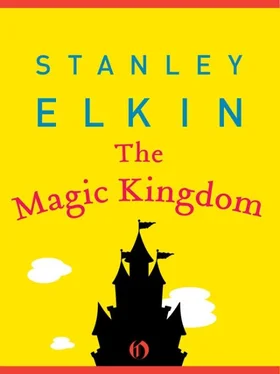She knew her impatience was hardly the Mary Poppins ideal, but it did not do to betray one’s character. She admitted when she was wrong. She was wrong in this instance. She admitted when she was wrong but she was all-forgiving. All right, she did play favorites, but she could have played God, come, were it required of her, to terrible determinations — who should live, who should die — and come to them, moreover, according to the same sound principles that permitted her to decide who should get the caramel, who must take the toffee.
She knew how she must appear to them, of course. People so loved their stereotypes. Living for others the sublimate life. They would put her down as a dried-up old maid. Quiet as a mouse and hung up in the love department on her male employers or, less flattering and more disgusting, her prepubescent charges. Playing with them, she suspected others suspected, in the tub, soaping and tickling their little thingummies till they stood up in the bathwater like periscopes. So she knew how she must appear to them. With a dried-up old pussy. More dust collector than sex organ. Nedra Carp giggled. The divine Mary Poppins had had her Bert, after all. Nedra was no libertine. Her juices happened not to flow in that direction, but she was no old maid. She’d had her ashes hauled, chim chim-i-ney, chim chim-i-ney, chim chim cheroo. It just wasn't that important, is all.
The nanny business was important, the nanny business was. And maybe, she thought, maybe you had to go around in a sort of disguise. Maybe other people’s stereotypes protected you, kept you hidden, quiet, wrapped up in cotton wool and otherwise engaged.
Because all her life she’d never forgiven them for abandoning her, all her life picked at her resentment, worried her loco parentis history, nursed her injured-Gretel misgivings.
And all because of the formative years, Nedra thought bitterly. The formative years. That small, not even full handful of kiddie time when anything that was not already stuffed into the genes — and for Nedra, as for Mary, between nature and nurture it was no contest — must be packed into the child like a kind of tuck pointing. If, as the poet said, the child was father to the man, the stepmothers, governesses, step-relations, and nannies were worth all the rest of relation. Particularly the nannies. (Because children that small would not have heard about stereotypes yet, would, before memory kicked in, have taken their imprinting from the available, anyone near at hand, anyone bigger or older or stronger than oneself, anyone: a close distant cousin would do; the upstairs maid; the lad from the greengrocer’s.) But particularly the nannies. Who drew, she recalled, the bath, and adjusted the temperature of the water, who came with towels of great thickness, the cozy naps and piles of love, who managed one’s meat and, later, held one’s small, still imperfect hands to the cutlery and guided one’s movements over the joint, who gave lessons in spreading jam and buttering toast, who offered the hankie as if it were a rose, who rinsed the cut and kissed the bruise, who showed the picture books, all the abecedarian “A is for Apple, B is for Bird” lap tutorials, and read the storybooks in the safe and serious weather of the quilt or blanket, who did first for the body the stations of kindness and later, like choirmasters prompting hymn, mouthed the close and intimate terms of prayer (kindness here, too: some infant noblesse oblige, and even the names of rivals offered to God, of detractors and enemies, the by-now thinned and thinning not-even consanguineous and imperfectly understood merely legal relation). And, still later yet, ministered to the soul itself, explaining, explaining away, the sudden breaches of faith and inexplicable hostilities of once close distant cousins. Taking actual instruction from them, a sort of convert, a sort of catechumen — no Catholic, she attended Mass as often as possible; it wasn’t the ceremony or the gorgeous trappings that attracted her, it was the absolute conviction and authority — it was to her nannies she turned whenever she felt confused, had run out of lessons she could apply to a new situation — Nedra was in command of many solutions and hundreds of explanations but few principles — seeking, though she didn’t know this, hadn’t learned it yet, neither explanations nor principles but only the old cocoa comforts. It was to a nanny she’d turned (though she’d outgrown them, no longer had one, was with the governesses now and had, since her own had left and this was a new girl, even lost the right to call her Nanny, though she did anyway, not realizing that in doing so — it was a different nanny who’d provided this explanation too, though to Nedra it would forever after seem a principle — she had unwittingly placed herself in a kind of authority over the girl, compromised the title, that only a present or former charge, employer, or fellow employee of the household retained that particular privilege — she said “privilege”—) to explain her period, a nanny who’d explained, explained away, her half brother’s cold warning that they could no longer enjoy, once the twins were born and he had a new half sister and half brother of his own, their special relationship. (“He’s sucking up to them, miss.”) The nannies whom she relied on for comfort and depended upon for what she still thought of as love. Except that they moved on too, were, in that department at least, as unreliable and transient as real mothers and fathers. And was shocked to discover that they were actually paid, were in it for money, were not merely some distant sort of relation themselves, like a kind of Cinderella, say, two or three times removed. (And, although she’d be the first to admit — admit to herself since it was no one else’s business and could only hurt others if it ever got out — that hers was hired-hand love too, Nedra Carp wasn’t in it for the money. For one, she had money.)
Who now waited for others to turn to her. Assuming, on those rare occasions when they did, the very same poses and attitudes her own nannies had assumed. Vaguely abstracted, detached, as if she wore imaginary shawls about her shoulders and had been come upon knitting, an aura of an old-aunty love clinging to her like some musty, foolish dignity.
Rena Morgan looked up from the television set, turned low so as not to disturb Lydia Conscience’s sleep.
“Was Prince Andrew brave?” she asked.
“Hmm?”
“Prince Andrew. Was he brave?”
“Oh, very brave, dear.”
“Even when he was small?”
“A little hero.”
“So you weren’t surprised when he went off to fight the Argies?”
“I expected it.”
“You did?”
“I was only surprised it took him so long.”
“Bravery is important, isn’t it, Nanny?”
“Quite important, dear. Valor is the sine qua non of gentlemen.”
“Of ladies too. Anyway, I should have thought so.”
“Bravery in men, patience in ladies.”
“Do you think so?”
“Women, well-brought-up women, don’t have the upper- body strength for true bravery.”
“When push comes to shove, do you mean?”
“What a clever way to put it! What a very bright little girl you are!”
“Thank you, Nanny, but there are many things I don’t understand.”
“If something’s troubling you, Rena dear, perhaps I can be of some help. Has that Janet Order been bothering you?”
“Janet Order?”
“She seems quite cheeky to me, and, though I shouldn’t be the one to say it, her blue color does put one off so. I noticed that you just picked at your food today. Your four basic food groups are extremely important, you know. If it’s Janet who’s putting you off your feed, I think I can arrange with Mister Moorhead and Mister Bale for you and Lydia to take your meals separately.”
Читать дальше












